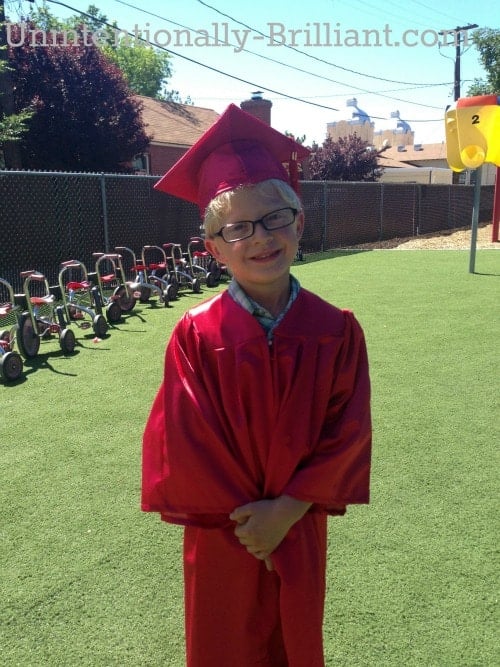
by Roxanne (USA) | Jun 21, 2013 | 2013, Childhood, Education, Kids, Milestones, Motherhood, Parenting, Preschool, Rox is Brilliant, School, Unintentionally Brilliant, USA, World Moms Blog, World Motherhood, Younger Children
 Earlier this month I attended my son’s graduation ceremony. He looked so handsome in his bright red cap and gown, smiling proudly at all he has accomplished. He clutched his little blue diploma when they called his name, and I was overcome with emotions that felt out of place. Especially considering the fact that my son had just finished Kindergarten.
Earlier this month I attended my son’s graduation ceremony. He looked so handsome in his bright red cap and gown, smiling proudly at all he has accomplished. He clutched his little blue diploma when they called his name, and I was overcome with emotions that felt out of place. Especially considering the fact that my son had just finished Kindergarten.
Literally. (more…)
Roxanne is a single mother to a 9-year-old superhero (who was born 7 weeks premature), living in the biggest little city and blogging all about her journey at Unintentionally Brilliant. She works as a Program Coordinator for the NevadaTeach program at the University of Nevada, Reno. Roxanne has a B.A. in English from Sierra Nevada College. She has about 5 novels in progress and dreams about completing one before her son goes to high school.
More Posts - Website
Follow Me:



by Nicole Melancon (USA) | Jun 18, 2013 | 2013, India, Social Good, Third Eye Mom, Uncategorized, World Voice
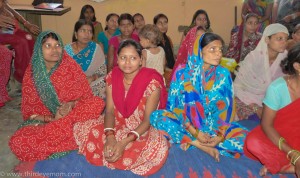
A pregnant mothers group at one of the slums served by Save the Children. Photo By Nicole Melancon
At the end of May I had the honor of traveling to India along with Jennifer James, founder of Mom Bloggers for Social Good, a global coalition of mom bloggers who use our voice through blogging and social media to spread awareness, education and support to the various NGOs around the world that are making a difference.
The purpose of our trip to India was to meet face to face with some of our partner NGOs and see firsthand some of the issues we cover as part of Mom Bloggers for Social Good: Maternal and newborn health, food and water poverty, sanitation issues, and education for women and girls.
Although this was not my first time to India (I had visited India a few years ago as a tourist) it was my first time going in a much different role: As a social good blogger and advocate. Seeing India in a different framework was utterly life changing.
India is perhaps one of the most fascinating places I’ve ever been and with its enormous population, and sensational culture comes issues that are often overwhelming to comprehend. Most people are aware of the huge inequities and poverty strangling India. Although India has seen rapid economic growth over the last decade, the gap between rich and poor has become even wider and more profound. As migrant families leave their villages in rural India and come to the big cities in search for a better life, the growth of urban slums, many in deplorable conditions, continues at unmanageable rates. In just Delhi alone, there are thousands of them. And as almost half a million migrants come to Delhi alone each year, many of them end up populating the already over-crowded urban slums that can be found all throughout the city, even alongside some of Delhi’s most expensive neighborhoods.
Our mission in India was to visit the heart of Delhi’s slums to see the issues firsthand and meet with our partner NGOs who are on the ground and making a difference in people’s lives.
It was not an easy trip. The weather was scorching hot with highs nearing 120 degrees Fahrenheit and visiting an urban slum in itself is heartbreaking and shocking. Although I’ve experienced poverty many times before in my travels I wasn’t prepared for the enormous magnitude of desperation that I found in India.
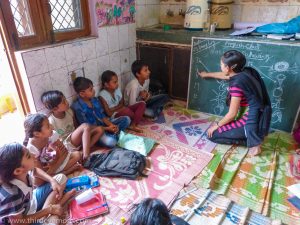
Girls learning at Pratham. Photo by Nicole Melancon
The highlight of our entire trip happened on our first day. We met with a small Indian non-profit organization called Protsahan. Founded by young Indian social entrepreneur Sonal Kapoor, Protsahan, uses a unique approach to teaching and inspiring young, underprivileged girls who come from some of the most tragic circumstances possible. All are poor, and many have been abused and have little opportunity to get an education or a way out of the poverty they were born into. Protsahan, which means “encouragement” uses the arts as a means to inspire, teach and motivate the girls to learn and strive for a brighter future. It was a heartwarming experience meeting Sonal and the girls that were striving to succeed and climb out of poverty. I left wishing we could stay longer. The love and tenderness of Sonal for the girls was overwhelming and made me realize that anyone can make a difference in the world and impact the lives of others.
Our second day was spent visiting another education-focused NGO called Pratham, which is the largest NGO working in India to provide quality education to the country’s millions of underprivileged children. We visited a Hub Center supporting 150 children that was located in a slum in Trilokpuri, East Delhi. The program model was slightly different from Protsahan as the classes were co-ed and also were offered for a minimal, yet affordable fee. Classes began at preschool age and continued on to more advanced English as well as vocational courses. What makes Pratham so unique is its approach to working with the government to create change.
Our final day was spent visiting two big NGOs, Save the Children and WaterAid, where we were able to do two field visits to different urban slums to see their work. In the morning , we visited some of Save the Children’s projects within the Okhla Industrial Area that hosts garment factories, home to over thousands of families living in unauthorized slums. Save the Children provides a variety of services to the slum such as a mobile health van where people can receive basic health care services, medication, and prenatal and newborn health check-ups which is extremely important in cutting maternal and newborn mortality rates. We also attended one of the weekly meetings for pregnant mothers where they are taught the skills needed to ensure their children’s survival.
We ended our day with WaterAid, an NGO that works all over the world to provide safe drinking water and sanitation services.
Ironically, we visited an unauthorized slum built right outside the lush, grand American Embassy.
Unauthorized slums are by far the most devastating places to live. Many do not have running water or sewer systems, which significantly threatens the health and livelihood of the people. At the Vivekanansa slum, we toured one of WaterAid’s Community Toilet Compounds (CTC) which provides safe, clean toilets to the hundreds of families that live in the community. WaterAid operates 78 CTCs all over Delhi as well as CTCs throughout India. The importance of having a CTC cannot be understated. Not only does it provide dignity, it also helps stop serious diseases which kills many children each year.
I left India feeling intense emotions. There were so many enormous issues that at times it was completely overwhelming. Yet, meeting some of the NGOS and people on the ground who are saving lives and making the world a better place, sometimes one person at a time, inspired hope that change can be made.
This is an original World Moms Blog post written by Nicole Melancon of ThirdEyeMom .
Have you been to India, or experienced the juxtaposition of these types of extremes?

Third Eye Mom is a stay-at-home mom living in Minneapolis, Minnesota with her two children Max (6) and Sophia (4). Her children keep her continually busy and she is constantly amazed by the imagination, energy and joy of life that they possess! A world wanderer at heart, she has also been fortunate to have visited over 30 countries by either traveling, working, studying or volunteering and she continues to keep on the traveling path.
A graduate of French and International Relations from the University of Wisconsin Madison, where she met her husband Paul, she has always been a Midwest gal living in Minnesota, Wisconsin and Chicago. This adventurous mom loves to be outside doing anything athletic (hiking, running, biking, skiing, snowshoeing or simply enjoying nature), to travel and volunteer abroad, to write, and to spend time with her beloved family and friends.
Her latest venture involves her dream to raise enough money on her own to build and open a brand-new school in rural Nepal, and to teach her children to live compassionately, open-minded lives that understand different cultures and the importance of giving back to those in need. Third Eye Mom believes strongly in the value of making a difference in the world, no matter how small it may be. If there is a will, there is a way, and that anything is possible (as long as you set your heart and mind to it!).
Visit her on her blog, Thirdeyemom, where she writes about her travels and experiences in other lands!
More Posts

by Maman Aya (USA) | Jun 14, 2013 | 2013, Being Thankful, Cancer, Childhood, Exercise, Health, Kids, Motherhood, Older Children, Running, Social Good, USA, World Motherhood, Younger Children
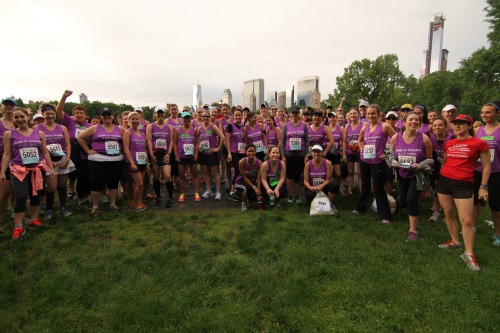 In early April I decided to step way outside my comfort zone and do something that I never thought I would do. I decided to run a race! I told you about my decision to run this 10K when I first wrote about it. It turned out to be a harder goal than I thought! Every Saturday morning, the Moms In Training team met in various parks around the city.
In early April I decided to step way outside my comfort zone and do something that I never thought I would do. I decided to run a race! I told you about my decision to run this 10K when I first wrote about it. It turned out to be a harder goal than I thought! Every Saturday morning, the Moms In Training team met in various parks around the city.
My group met in Madison Square Park with an amazing trainer, Meri of Mommy and Me Fitness, who had an hour-long workout prepared for us. We walked, jogged, ran circles in the park. We did squats, lunges, planks, jumping jacks, push-ups and other concoctions that she would throw at us. We worked hard, and had fun while doing it!
Lindsey, a fellow Mom In Training, described the way I felt very well when she wrote about her experience with Moms In Training, “Somehow I left my comfort zone behind and decided to join. With the help of a wonderful trainer, Meri, and the support of the other moms, I trained for the 10K. On the day of the 10K, I was joined by another mom who stuck with me through the entire race and definitely kept me running WAY longer than I thought I would or could.” (more…)

Maman Aya is a full-time working mother of 2 beautiful children, a son who is 6 and a daughter who is two. She is raising her children in the high-pressure city of New York within a bilingual and multi-religious home.
Aya was born in Canada to a French mother who then swiftly whisked her away to NYC, where she grew up and spent most of her life. She was raised following Jewish traditions and married an Irish Catholic American who doesn’t speak any other language (which did not go over too well with her mother), but who is learning French through his children. Aya enjoys her job but feels “mommy guilt” while at work. She is lucky to have the flexibility to work from home on Thursdays and recently decided to change her schedule to have “mommy Fridays”, but still feels torn about her time away from her babies. Maman Aya is not a writer by any stretch of the imagination, but has been drawn in by the mothers who write for World Moms Blog. She looks forward to joining the team and trying her hand at writing!
More Posts
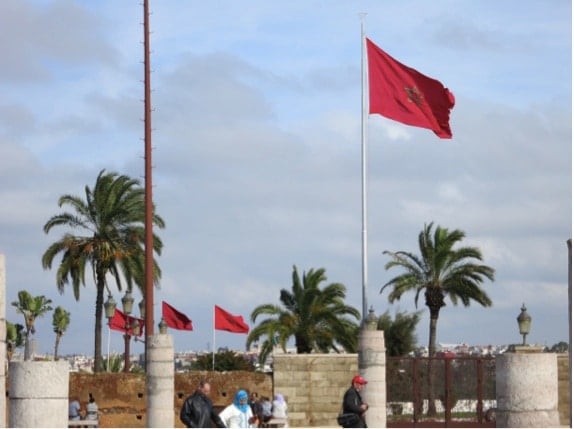
by Jennifer Prestholdt (USA) | Jun 11, 2013 | 2013, Human Rights, International, Morocco, World Moms Blog, World Voice

Photo by Jennifer Prestholdt
Hidden Child Labor
While millions of tourists visit Morocco every year, very few are aware of a hidden human rights abuse that is occurring behind closed doors in Morocco’s cities. Morocco has one of the worst child domestic labor problems in North Africa. The International Labour Organization (ILO) has estimated that between 66,000 and 88,000 children between the ages of 7 and 15 – 70% of whom are under age 12 – are working as domestic servants in Morocco.
These children work long hours for little pay and often suffer physical and other forms of abuse. Because domestic work is “women’s work” in Morocco, virtually all of these child domestic workers are girls. In Morocco (a country with a French colonial history), these child domestic workers are called petites bonnes or “little maids”.
I had the opportunity to learn more about the petites bonnes issue during a recent trip to Morocco. The United States Department of Labor’s Bureau of International Labor Affairs describes the problem like this:
Young girls are sent to work as live-in domestic servants, often before they reach age 10. Parents sell their daughters or receive payment of wages in exchange for their daughters’ service. These petites bonnes (little maids) often face conditions of involuntary servitude, including long hours without breaks; physical, verbal and sexual abuse; withheld wages and even restrictions on their movement. Frequently, they are sent from rural villages to more urban areas, and find it difficult to make their way home. Most petites bonnes are denied an education, and illiteracy rates are high among this population.
The Difficult Life of a Petite Bonne
The situation of petites bonnes in Morocco results from a combination of poverty, gender inequality, and lack of access to education. Girls – some as young as my own 8-year-old daughter – are sent to work as petites bonnes to generate income to support their families. They come from poor rural areas to work in cities such as Casablanca, Rabat, Marrakech, Tangiers, Agadir, and Fes. Intermediaries generally broker the arrangement, receiving a fee from the employer. Petites bonnes interviewed by Human Rights Watch reported that their employers frequently beat and verbally abused them, denied them the chance to go to school, and sometimes even refused to provide them with adequate food and sleeping facilities.
In a strange city, separated from their families and often speaking a Berber language instead of the Arabic spoken by a majority of Moroccans, many petites bonnes are extremely isolated and vulnerable. The isolation, along with the privacy of the homes, increases the chance of sexual abuse by male members of their employers’ household. In fact, several studies have found that many unwed young mothers in shelters in Morocco were petites bonnes when they became pregnant.
The difficult life of a petite bonne sometimes ends tragically. The widely reported story of little Khadija, an 11-year-old petite bonnewho was beaten to death by her employer in July 2011, raised calls for the government to take action on the issue. In January 2013, a 17 year old petite bonne in Casablanca attempted suicide by jumping from the fourth floor of her employers’ home. Amateur video of the suicide attempt that was circulated on the internet shocked Moroccans. Most recently, on March 24, 2013, a young domestic worker was taken to the hospital in Agadir with third degree burns on multiple parts of her body. Only 14 years old, she died from the injuries allegedly inflicted by her employers, prompting a UN representative in Morocco to decry child domestic labor by girls as “one of the worst forms of child exploitation” and call on the government to take action. Yet, thousands of petites bonnes in Morocco continue to suffer in silence.
Gaps in Legal Protection
According to NGOs working to help petites bonnes in Morocco, part of the problem relates to gaps in and difficulties with implementation of Moroccan laws. While Moroccan law prohibits employment of children under the age of 15, Morocco’s Labor Code does not apply to domestic work. Therefore, the Labor Codes’ protections for workers regarding hours worked (44 hours per week) and pay (2,333 dirhams or approximately $261 per month) do not apply. Human Rights Watch has documented that petites bonnes work long hours, often seven days a week. They earn an average of 545 dirhams (approximately $61) per month, but some earn as little as 100 dirhans (approximately $11).
In addition, Morocco ratified the Convention on the Rights of the Child (CRC) in 1993 and the ILO Convention No 182 on the Worst Forms of Child Labor. Both international treaties prohibit economic exploitation and employment of children in work that is likely to be hazardous, interfere with their education, or harm their health, safety or development. Unfortunately, neither have been implemented in a way that provides adequate protection to the petites bonnes.
Some Progress in Protecting Children
There is some indication that things are starting to change in Morocco. The government and international human rights organizations report that the number of girls working as petites bonnes is declining. This is due in part to the fact that public awareness about the problems faced by petites bonnes has been raised because of increased media attention to the issue and public education campaigns undertaken by the Moroccan government, NGOs, and United Nations agencies. The Moroccan government has also taken steps to increase school enrollment and this has helped reduce the number of children engaged in child labor.
Yet still more needs to be done. Since 2006, the government has been working on a draft law on domestic work that would for the first time establish a legal framework to better protect petites bonnes, secure rights such as a weekly day of rest and annual leave, and impose sanctions on employers. The Moroccan government has said that the draft Law on Domestic Workers is one of its priorities, but the bill has not yet been considered and passed by Parliament.
Take Action on June 12 – World Day Against Child Labour!
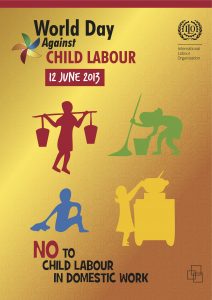 The problem of child domestic workers is not unique to Morocco. In fact, there are an estimated 15.5 million child domestic workers worldwide. The widespread use of children as domestic servants is one of the most hidden forms of child labor.
The problem of child domestic workers is not unique to Morocco. In fact, there are an estimated 15.5 million child domestic workers worldwide. The widespread use of children as domestic servants is one of the most hidden forms of child labor.
The exploitation of children, particularly girl domestic workers like petites bonnes, is a serious violation of children’s rights. It perpetuates inequality and inter-generational poverty, and deprives girls of their right to education, health, participation and protection. It also prevents children from acquiring the life skills and education necessary to improve their future.
To draw attention to the issue of child labor, the United Nations has recognized June 12 as the World Day Against Child Labour. In 2013, the focus is on child domestic workers like the petites bonnes of Morocco. On the 2013 World Day Against Child Labour, the international community is calling for legislative and policy reforms to ensure the elimination of child labor in domestic work and the provision of decent work conditions and appropriate protection to young workers in domestic work who have reached the legal working age. In Morocco, the government should:
• Strictly enforce the minimum age of 15 for all employment (including domestic work) and ensure that all children (particularly girls) enjoy the right to free and compulsory basic education;
• Adopt a domestic worker law that ensures compliance with the 2011 ILO Convention 189 on decent work for domestic workers
• Create an effective system for identifying, removing and rehabilitating child domestic workers from illegal or abusive employment.
• Criminally prosecute individuals responsible for violence or other criminal offenses against child domestic workers.
In addition, the World Day Against Child Labour provides the opportunity for all of us to take action to build the worldwide movement against child labor.
Take Action to end child labor. Learn what you can do to inform yourself and raise awareness in your community. The ILO’sSCREAM (Supporting Children’s Rights through Education, the Arts and Media) programme has factsheets, presentations, postcards, poems, and more. The SCREAM education pack is available in multiple languages.
Join the 12to12 to End Child Labour community. Learn more about the issue and join the 12to12 Community Portal, which provides a common platform for experience and knowledge sharing on research, activities and events related to the World Day Against Child Labour.
Find out what kids and teens can do to help. The ILO’s Youth in Action against Child Labour campaign has ideas, information, videos and other resources to help young people take action to end child labor.
Make a pinwheel with your kids. The pinwheel has become the symbol of the international fight against child labor. The pinwheel campaign to raise awareness about child labor began in Brazil in 2004. The five blades of the pinwheel represent the different continents of the world and the wind that makes the pinwheel spin is the will to act and to pass on the message until all countries take adequate measures to end child labor. Download a kit to make a pinwheel to keep the movement going!
This is an original World Moms Blog post written by Jennifer Prestholdt.
Were you aware of the international child labor issue? Does it exist in the country in which you live?

Jennifer Prestholdt is a lawyer and the Deputy Director of The Advocates for Human Rights, a volunteer-based human rights organization that works locally, nationally and internationally. Her work in human rights takes her around the world, but she spends most of her time in Minneapolis, MN, where she lives with her children (two sons and one daughter), her husband, an elderly cat and a dwarf hamster.
As Jennifer’s kids are now all in school (1st, 4th and 6th grades), she is finally finding more time to do the things that she used to love to do, especially running, writing and knitting. Jennifer loves to travel and has had the dubious distinction of having been accidentally locked in a bathroom on five continents so far. Australia and Antarctica await!
In January 2011, Jennifer made a New Year’s Resolution to start writing about her experiences in order to share with her children the lessons learned from 15 years of work in human rights. The result is her personal blog, The Human Rights Warrior. The name comes from her son Simon, who was extremely disappointed to learn that his mother is a lawyer, not a warrior.
You can find her on her blog The Human Rights Warrior or on Twitter @Jprestholdt.
More Posts

by World Moms Blog | Jun 4, 2013 | 2013, Human Rights, International, Turkey, World Voice
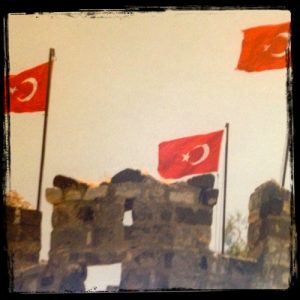
I am a Turkish mom, who is raising my 3 kids in the United States of America during the school season and in TURKEY for the summers. My husband and I made the conscious decision to raise our kids immersed in both of our cultures. Growing up in the democratic and secular country that Ataturk founded, I was nurtured in a climate of peace and freedom. I attended college in Switzerland and then in the United States, and I pride myself in being an independent and strong woman.
Ataturk’s western leaning values and teachings of acceptance, tolerance, honesty, hard work, and respect, still guide me today while I live with my American husband, and raise our kids.
We love taking our kids to Istanbul every summer. We have extended family and friends who welcome us. My oldest son swims in the Cross Continent Swim Meet each year. Where else in the world can one be in Asia and Europe within minutes? The kids spend the summers playing with their second and third cousins, and making new friends. We are exposing our kids not only to their own culture but also to others by traveling to historic sights, living world history, and showing them how all different religions, and ethnicities live in harmony in the same country. Although the religion of the population in Turkey is predominantly Muslim, it’s government is secular, and Turkey is a home for all religions and ethnic backgrounds. Everyone is free to practice what he or she believes. Well I should say everyone WAS free…
As I am sure most of you are aware by now, what started as a peaceful “save the tree” protest last week, has turned into a Revolution. Turkey elected a prime minister more than a decade ago, Recep Tayyip Erdoğan, who has over the years leaned increasingly towards autocracy . He wants to build malls over parks, as a way to fill his pockets, demolish art centers and theaters, and build mosques to force his brand of conservative religion down everyone’s throat. He has sent his forces in to use tear gas, beat, throw illegal chemical compounds, and to imprison others whom he regards as threats to his Islamic régime. As the laws of the land do not seem to apply anymore in the country, I fear for my own children’s future, my niece who is in Istanbul, my family, my friends, my fellow citizens safety, and then I fear for the whole world’s safety. The new growing Turkey that has brought together worlds of religion, cultures and worldly growth is suddenly showing inordinate levels of intolerance.
I am a Turkish American mom who wants raise her kids in a world with peace, love, and tolerance in harmony. The world needs to know what is going on in Turkey right now, and to know that this is not the country that the Turkish people are used to, and apparently, based on the uprisings going on now, it is not the way they wish to live. It is no longer just about saving trees or the park, but about regaining democratic human rights.
This is an original guest post written for World Moms Blog by Ebru who grew up in Istanbul, Turkey, and now splits her time between Istanbul and the United States of America.
Have you been following the story of the uprising in Turkey?
World Moms Blog is an award winning website which writes from over 30 countries on the topics of motherhood, culture, human rights and social good. Over 70 international contributors share their stories from around the globe, bonded by the common thread of motherhood and wanting a better world for their children.
World Moms Blog was listed by Forbes Woman as one of the "Best 100 Websites for Women 2012 & 2013" and also called a "must read" by the NY Times Motherlode in 2013. Our Senior Editor in India, Purnima Ramakrishnan, was awarded the BlogHer International Activist Award in 2013.
More Posts

by Meredith (USA) | May 31, 2013 | 2013, Adoption, Childhood, Family, Infertility, Kids, Motherhood, Parenting, Preschool, SAHM, School, Younger Children
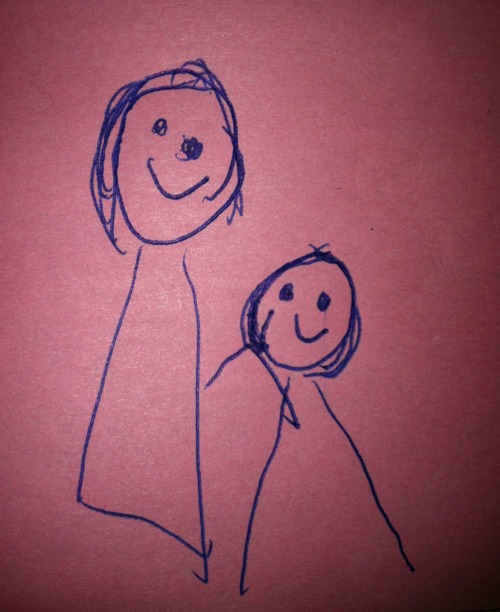 I was watching my daughter play with a bubble machine today. She and I were laughing as she was running through the bubbles, and we were both looking at the bubbles floating up to the sky trying to see different images. I looked over at her as she watched the bubbles drift away and she had the biggest, sweetest smile on her face. I wondered in my mind if she would remember this extra special ordinary day because I knew I was making an imprint of it in my own mind…these special moments with just the two of us in the middle of the day in the middle of a week are starting to slip through my fingers… (more…)
I was watching my daughter play with a bubble machine today. She and I were laughing as she was running through the bubbles, and we were both looking at the bubbles floating up to the sky trying to see different images. I looked over at her as she watched the bubbles drift away and she had the biggest, sweetest smile on her face. I wondered in my mind if she would remember this extra special ordinary day because I knew I was making an imprint of it in my own mind…these special moments with just the two of us in the middle of the day in the middle of a week are starting to slip through my fingers… (more…)
Meredith finds it difficult to tell anyone where she is from exactly! She grew up in several states, but mainly Illinois. She has a Bachelor of Science degree in Elementary Education from the University of Illinois at Champaign/Urbana which is also where she met her husband. She taught kindergarten for seven years before she adopted her son from Guatemala and then gave birth to her daughter two years leter. She moved to Lagos, Nigeria with her husband and two children in July 2009 for her husband's work. She and her family moved back to the U.S.this summer(August 2012) and are adjusting to life back in the U.S. You can read more about her life in Lagos and her adjustment to being back on her blog: We Found Happiness.
More Posts

 Earlier this month I attended my son’s graduation ceremony. He looked so handsome in his bright red cap and gown, smiling proudly at all he has accomplished. He clutched his little blue diploma when they called his name, and I was overcome with emotions that felt out of place. Especially considering the fact that my son had just finished Kindergarten.
Earlier this month I attended my son’s graduation ceremony. He looked so handsome in his bright red cap and gown, smiling proudly at all he has accomplished. He clutched his little blue diploma when they called his name, and I was overcome with emotions that felt out of place. Especially considering the fact that my son had just finished Kindergarten.






 In early April I decided to step way outside my comfort zone and do something that I never thought I would do. I decided to run a race! I told you about my decision to run this 10K when I
In early April I decided to step way outside my comfort zone and do something that I never thought I would do. I decided to run a race! I told you about my decision to run this 10K when I 





 I was watching my daughter play with a bubble machine today. She and I were laughing as she was running through the bubbles, and we were both looking at the bubbles floating up to the sky trying to see different images. I looked over at her as she watched the bubbles drift away and she had the biggest, sweetest smile on her face. I wondered in my mind if she would remember this extra special ordinary day because I knew I was making an imprint of it in my own mind…these special moments with just the two of us in the middle of the day in the middle of a week are starting to slip through my fingers…
I was watching my daughter play with a bubble machine today. She and I were laughing as she was running through the bubbles, and we were both looking at the bubbles floating up to the sky trying to see different images. I looked over at her as she watched the bubbles drift away and she had the biggest, sweetest smile on her face. I wondered in my mind if she would remember this extra special ordinary day because I knew I was making an imprint of it in my own mind…these special moments with just the two of us in the middle of the day in the middle of a week are starting to slip through my fingers… 


